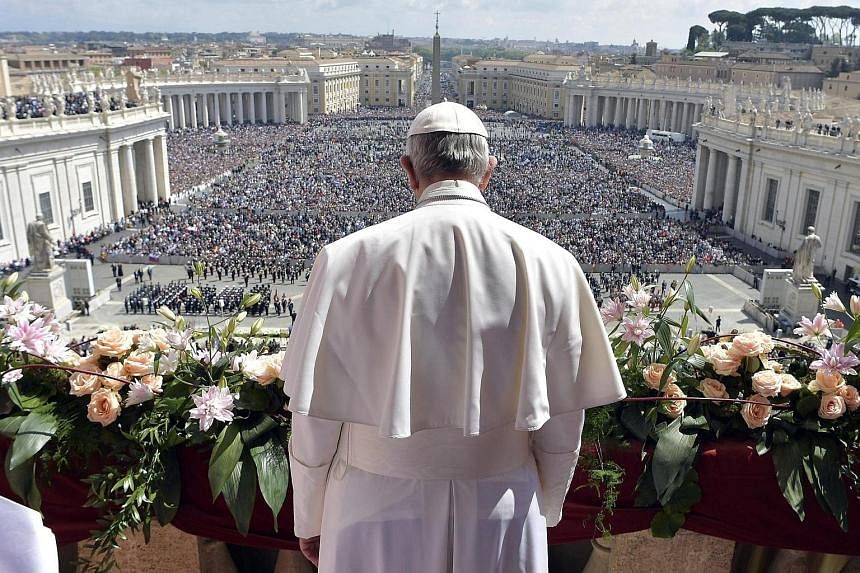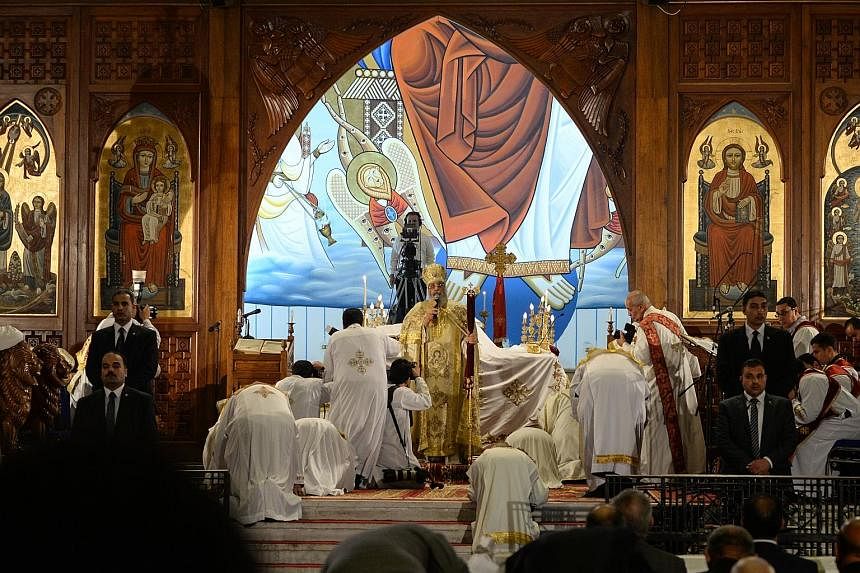VATICAN CITY • Pope Francis denounced "oppressive regimes" in his Easter message yesterday, but in an apparent call for restraint, urged world leaders to prevent the spread of conflicts, as tensions rose in North Korea and Syria.
Pope Francis, marking the fifth Easter season of his pontificate, said mass before tens of thousands of people under exceptional security measures in St Peter's Square, following recent vehicle attacks against pedestrians in London and Stockholm.
More police vans and army vehicles than usual were positioned at the entrances to the Vatican area and the faithful were stopped at several checkpoints leading into the square, which was decorated with 35,000 flowers and trees.
In his Urbi et Orbi (to the city and the world) message, delivered from the central balcony of St Peter's Basilica, Pope Francis spoke of a world lacerated by conflicts and laced with tensions.
From the same balcony where he first appeared to the world on the night of his election in 2013, Pope Francis spoke of God walking "beside all those forced to leave their homelands as a result of armed conflicts, terrorist attacks, famine and oppressive regimes".
He did not name any specific governments.
"In the complex and often dramatic situations of today's world, may the Risen Lord guide the steps of all those who work for justice and peace. May he grant the leaders of nations the courage they need to prevent the spread of conflicts and to put a halt to the arms trade," he said.
Pope Francis also condemned the bomb blast on a crowded Syrian bus convoy that killed at least 112 people outside Aleppo as an "ignoble" attack, asking God to bring healing and comfort to the civilian population in what he called the "beloved and martyred Syria".
Speaking on the most important day in the Christian liturgical calendar, he called for peace in South Sudan, Sudan, Somalia, the Democratic Republic of Congo and Ukraine. A surprise downpour hit Rome as the mass was held but it passed quickly, allowing Pope Francis to ride around in an open Popemobile so people at the back of the crowd could see him.
Repeatedly during Holy Week services, Pope Francis has drawn attention to the plight of war victims, refugees and migrants. On Good Friday, he spoke of the "shame" of humanity becoming inured to daily scenes of bombed cities and drowning migrants.
Meanwhile, Egypt's Coptic Christians observed Easter under tight security, with the ancient minority still reeling from twin church bombings that killed dozens just days before.
In Saint Mark's Cathedral, where Coptic Pope Tawadros II led the mass on Saturday, worshippers passed through three metal detectors as policemen and soldiers stood guard in the sprawling compound and on the streets outside.
"We pray for peace to spread in hearts and minds," Pope Tawadros said in a speech during mass, describing the bombings as "beyond the boundaries of humanity".
Two suicide bombers from the Islamic State in Iraq and Syria (ISIS) militant group struck two churches north of the capital Cairo on April 9, killing 45 people in the worst attack on Copts in recent memory.
Following the Palm Sunday attacks, the church had said it would scale back Easter celebrations.
AGENCE FRANCE-PRESSE, REUTERS


